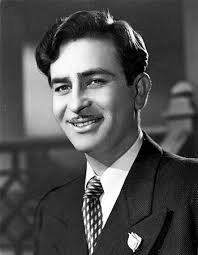
Raj Kapoor, often referred to as the “Greatest Showman of Indian Cinema,” was one of the most iconic and influential filmmakers and actors in the history of Bollywood. His contribution to Indian cinema spans over five decades, and his legacy continues to inspire filmmakers and actors even today. He was not just an actor but also a director, producer, and an innovator, known for his artistic vision and larger-than-life storytelling. Here’s a look at his life and career:
Early Life:
Raj Kapoor was born on December 14, 1924, in Peshawar (now in Pakistan), to the famous actor and director Prithviraj Kapoor and his wife Ramabai Kapoor. Raj Kapoor came from a family deeply entrenched in the world of theater and film. His father, Prithviraj Kapoor, was a renowned actor, and his family was involved in the Prithvi Theatre, which Prithviraj had founded. Growing up in this environment, Raj was exposed to the world of cinema and the performing arts from a young age.
Raj Kapoor was one of the five children in the family. He went to Collegiate School in Peshawar and later moved to Mumbai (then Bombay) with his family after the partition in 1947.
Early Career:
Raj Kapoor’s entry into the film industry began at a very young age. His first appearance in a film was as a child artist in “Inquilab” (1935). However, his major breakthrough came in the late 1940s. He started his career as an assistant director before making his debut as a lead actor in the film “Neel Kamal” (1947). The movie was a success and helped establish his presence in the film industry.
In 1948, Raj Kapoor set up his own production company, Raj Kapoor Films, and began making films under his banner. His directorial debut came with the movie “Aag” (1948), which did not do well at the box office but was an important milestone in his journey as a filmmaker.
Filmography
| Year | Film | Actor | Producer | Director | Role | Notes |
|---|---|---|---|---|---|---|
| 1935 | Inquilab | Yes | No | No | N/A | Child artist |
| 1943 | Hamari Baat | Yes | No | No | N/A | |
| 1943 | Gauri | Yes | No | No | N/A | |
| 1946 | Valmiki | Yes | No | No | N/A | |
| 1947 | Neel Kamal | Yes | No | No | Madhusudhan | |
| 1947 | Jail Yatra | Yes | No | No | N/A | |
| 1947 | Dil Ki Rani | Yes | No | No | Madhav (Madho) | |
| 1947 | Chittor Vijay | Yes | No | No | N/A | |
| 1948 | Aag | Yes | Yes | Yes | Kewal Khanna | Directorial debut |
| 1948 | Gopinath | Yes | No | No | Mohan | |
| 1948 | Amar Prem | Yes | No | No | N/A | |
| 1949 | Andaz | Yes | No | No | Rajan | |
| 1949 | Sunehre Din | Yes | No | No | Premendra | |
| 1949 | Parivartan | Yes | No | No | N/A | |
| 1949 | Barsaat | Yes | Yes | Yes | Pran | |
| 1950 | Sargam | Yes | No | No | Vinod | |
| 1950 | Pyaar | Yes | No | No | N/A | |
| 1950 | Jan Pahechan | Yes | No | No | Anil | |
| 1950 | Dastan | Yes | No | No | Raj | |
| 1950 | Bawre Nain | Yes | No | No | Chand | |
| 1950 | Banwra | Yes | No | No | N/A | |
| 1951 | Awaara | Yes | Yes | Yes | Raj Raghunath | |
| 1952 | Anhonee | Yes | No | No | Rajkumar Saxena | |
| 1952 | Bewafa | Yes | No | No | Raj | |
| 1952 | Ashiana | Yes | No | No | Raju | |
| 1952 | Amber | Yes | No | No | Raj | |
| 1953 | Aah | Yes | Yes | No | Raj Raibahadur | |
| 1953 | Dhoon | Yes | No | No | Raj | |
| 1953 | Paapi | Yes | No | No | Raju / Swami Satyananand | |
| 1954 | Boot Polish | Yes | Yes | No | Man on the Train | Cameo appearance |
| 1955 | Shree 420 | Yes | Yes | Yes | Ranbir Raj | |
| 1956 | Chori Chori | Yes | No | No | Sagar | |
| 1956 | Jagte Raho | Yes | Yes | No | Peasant | |
| 1957 | Sharada | Yes | No | No | Chiranjeev / Shekhar | |
| 1957 | Ab Dilli Dur Nahin | No | Yes | No | — | |
| 1958 | Phir Subha Hogi | Yes | No | No | Ram Babu | |
| 1958 | Parvarish | Yes | No | No | Raja J. Singh | |
| 1959 | Anari | Yes | No | No | Raj Kumar | |
| 1959 | Main Nashe Mein Hoon | Yes | No | No | Ram Das Khanna | |
| 1959 | Kanhaiya | Yes | No | No | Kanhaiya | |
| 1959 | Do Ustad | Yes | No | No | Raj Kumar | |
| 1959 | Char Dil Char Rahen | Yes | No | No | Govinda | |
| 1960 | Shriman Satyawadi | Yes | No | No | Vijay | |
| 1960 | Chhalia | Yes | No | No | Chhalia | |
| 1960 | Jis Desh Men Ganga Behti Hai | Yes | Yes | No | Raju | |
| 1961 | Nazrana | Yes | No | No | Rajesh | |
| 1962 | Aashiq | Yes | No | No | Gopal / Uday Kumar | |
| 1963 | Ek Dil Sau Afsane | Yes | No | No | Shekhar | |
| 1963 | Dil Hi To Hai | Yes | No | No | Chand / Khan Sahib | |
| 1964 | Sangam | Yes | Yes | Yes | Sundar Khanna | |
| 1966 | Teesri Kasam | Yes | No | No | Hiraman | |
| 1967 | Deewana | Yes | No | No | N/A | |
| 1967 | Around the World | Yes | No | No | Raj Singh | |
| 1968 | Sapno Ka Saudagar | Yes | No | No | Raj Kumar / Raju | |
| 1970 | Mera Naam Joker | Yes | Yes | Yes | Raju | |
| 1971 | Kal Aaj Aur Kal | Yes | Yes | No | Ram Kapoor | |
| 1973 | Bobby | No | Yes | Yes | — | Launched Rishi Kapoor |
| 1973 | Mera Desh Mera Dharam | Yes | No | No | N/A | |
| 1975 | Dharam Karam | Yes | No | No | N/A | |
| 1975 | Do Jasoos | Yes | No | No | Dharamchand Jasoos | |
| 1976 | Khaan Dost | Yes | No | No | N/A | |
| 1977 | Chandi Sona | Yes | No | No | N/A | |
| 1978 | Satyam Shivam Sundaram | No | Yes | Yes | — | |
| 1980 | Abdullah | Yes | No | No | Abdullah | |
| 1981 | Biwi O Biwi | No | Yes | No | — | |
| 1982 | Gopichand Jasoos | Yes | No | No | Gopichand Jasoos | |
| 1982 | Vakil Babu | Yes | No | No | Advocate Satyaprakash Mathur | |
| 1982 | Prem Rog | No | Yes |
Family and Personal Life:
Raj Kapoor married Krishna Malhotra in 1946, and the couple had five children: Randhir Kapoor, Rishi Kapoor, Rajiv Kapoor, Rima Kapoor, and Ritu Kapoor. Rishi Kapoor, like his father, became one of Bollywood’s most beloved stars. The Kapoor family is one of the most well-known and respected dynasties in Indian cinema.
Raj Kapoor was a highly social person who maintained relationships with several influential figures in the film industry, including his contemporaries like Dilip Kumar, Dev Anand, and others.
Challenges and Later Years:
While Raj Kapoor enjoyed massive success in the 1950s and 1960s, his career was not without its struggles. His ambitious film “Mera Naam Joker” (1970) was a commercial failure, which severely impacted his finances. However, Raj Kapoor bounced back with “Bobby” (1973), a film directed by his son Randhir Kapoor, which became a huge success.
Raj Kapoor’s later films like “Satyam Shivam Sundaram” (1978), “Hawa Mahal” (1981), and “Ram Teri Ganga Maili” (1985) saw him exploring themes of spirituality, sensuality, and patriotism. Though these films did not match the commercial success of his earlier works, they contributed to his enduring legacy as a visionary filmmaker.
Awards and Recognition:
Raj Kapoor’s influence on Indian cinema was immense, and he received numerous accolades throughout his career. Some of his major honors include:
- Padma Bhushan (1971) – India’s third-highest civilian award, for his contribution to Indian cinema.
- Dadasaheb Phalke Award (1987) – India’s highest award for lifetime achievement in cinema.
- Filmfare Lifetime Achievement Award (1997).
- National Film Awards for his contributions to Indian cinema and for his exemplary filmmaking.
- Honorary Awards and International Recognition for his impact on world cinema.
Legacy and Death:
Raj Kapoor passed away on June 2, 1988, at the age of 63. He left behind an immense legacy, not just through his films but also through his influence on the Kapoor family, with his sons continuing his cinematic legacy. Raj Kapoor is remembered for his artistic vision, his love for cinema, and his ability to capture the essence of Indian society in his films.
His studio, RK Films, was a major production house in Bollywood, and the RK Studio in Mumbai became a landmark in the history of Indian cinema. Raj Kapoor’s films, especially Awaara, Shree 420, and Mera Naam Joker, remain relevant even today, with many film buffs and filmmakers citing him as a huge influence.
Raj Kapoor’s contribution to Bollywood is immeasurable. His portrayal of the common man, his romanticism, his technical skills as a filmmaker, and his pioneering efforts in making Bollywood films for a global audience have made him a true legend in Indian cinema.
SOCIAL MEDIA LINKS :
YOUTUBE : https://www.youtube.com/watch?v=BjDjQJT3ZGE&pp=ygUUUmFqIEthcG9vciBpbnRlcnZpZXc%3D



